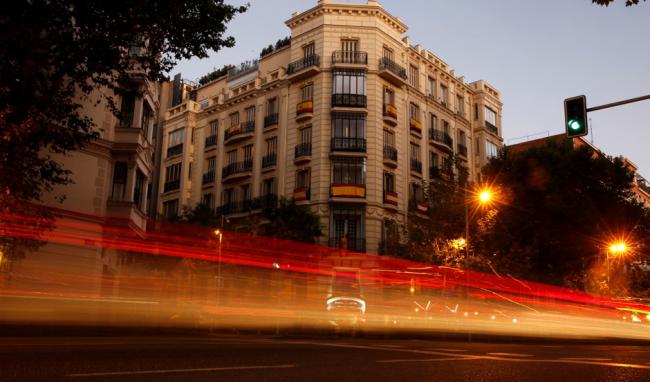Articles Menu

[Comment on this article by David Hendrickson @davidjhen on Twitter:
And Delta BC wants a 10 lane bridge towards endless congestion...
David Hendrickson added,
CityLabVerified account @CityLab
Spain wants to ban cars in dozens of cities, and the public’s on board, @FeargusOSull reports https://trib.al/oYsg6CD
5:56 PM - 30 Nov 2018 from Vancouver, British Columbia
As governments in many European nations get more aggressive about removing cars from their densest city centers, they often have to perform a balancing act. Touting the environmental and lifestyle benefits of car bans can quickly run up against opposition from a public that’s used to driving where it wants, even when the detractors don’t live in the affected cities.
That pattern makes it all the more notable that Spain is planning a sweeping ban to remove the vast majority of cars from city centers across the country—and that the move has broad support among the public.
According to a new poll released by IPSOS this week, 63 percent of respondents favored severely restricting car access in downtown areas. In the Northwestern region of Galicia, a favorable attitude toward such bans went as high as 78 percent.
That’s sure to be welcome news to Spain’s current government as it drafts a law on that matter. It’s an effort that could ban all but zero-emissions vehicles in the center of any town of over 50,000 residents by 2025, a ruling that would apply to 138 cities across the country. The first of those zones has in fact just arrived: On Friday, central Madrid became an ultra-low emissions zone, protected against pollution and congestion by the toughest restrictions on cars in place on a large scale in any major European city.
These restrictions will transform the way Madrileños get around their city, and will no doubt require some public readjustment. They are nonetheless popular, with 64 percent of people in the city supporting the move, on par with Catalonia’s 65 percent favorability of such restrictions. Galicia’s even higher rates could be boosted by the demonstrated success of pedestrianization in the city of Pontevedra.
Even on a continent becoming ever more conscious of pollution and global warming, the level of support is striking. In Norway, a country with an all-but peerless reputation for green leadership, a more modest 54 percent of Oslo residents were in favor of a central car ban, a level of support that, following a backlash, some polls allege has dropped to the point that 83 percent of residents are now against.
The greater level of support in Spain could be partly down to the layout of the country’s cities, which are not just dense, but hyper-dense. Across Europe, only Paris matches the heavy concentrations of residents found on Barcelona, Madrid, and Valencia (all traceable in this remarkable map).
One single square kilometer at the heart of Madrid’s new car-free zone is home to almost 45,000 people, almost three times as many residents as in the most densely populated square kilometer of Oslo. Spanish suburbs, meanwhile, are often denser than many North American downtowns, with large numbers of people living in taller buildings and more likely to be exposed to road traffic. The issue of pollution in dense urban areas is thus a central one to a large section of the population. It may not be a coincidence that the only major European city to have something similar to Madrid’s ultra-low emissions zone is Paris, the only other European metropolis to match Spain’s urban densities. And while Paris’s restrictions on more heavily polluting vehicles have come to be accepted as normal, its restrictions on car access to some central streets has proved extremely contentious.
Spanish attitudes to car policies also seem to be very closely tied to political affiliation. The levels of support for car-calming measures among the left and center-left political parties are such that it’s possible that support for one has come to mean support for the other. According to the survey’s results from Madrid, 93 percent of supporters of Podemos, Spain’s main left party, and 88 percent of the center-left Socialist Party, currently heading the government, support city-center car bans. That level drops to 48 percent for supporters of center-right liberals Ciudadanos, and down further to 42 percent for supporters of the right wing Popular Party, suggesting that even to the right of the political spectrum, support is still substantial without reaching a majority.
There’s another key reason the Spanish are more amenable to the thought of squeezing cars out of cities. The idea of introducing such policies has been part of the public conversation for years. With Madrid’s first such car-restricted zone, which starts today, a 1.8-square-mile (472 hectares) ultra-low emissions zone will transform the city’s transit network.
The new zone will ban through-traffic—currently estimated at over 58,000 vehicles a day—and severely restrict drivers’ access even for people whose ultimate destination lies within the zone’s borders. From Friday, all gas-fueled cars built before 2000 and all diesel vehicles from before 2006 will be banned from this area of inner Madrid. In 2020, this ban will be further tightened to restrict all gas cars from before 2006 and all diesel from before 2014. People with limited mobility will be exempted, as will residents within the zone, who will also be allowed to register up to 20 visitors a month. These strict limitations should do much to clean the city’s notoriously dirty air. It’s estimated that after the zone’s introduction NO2 levels in the area will drop by as much as 40 percent.
[Photo: Andrew Winning/Reuters]